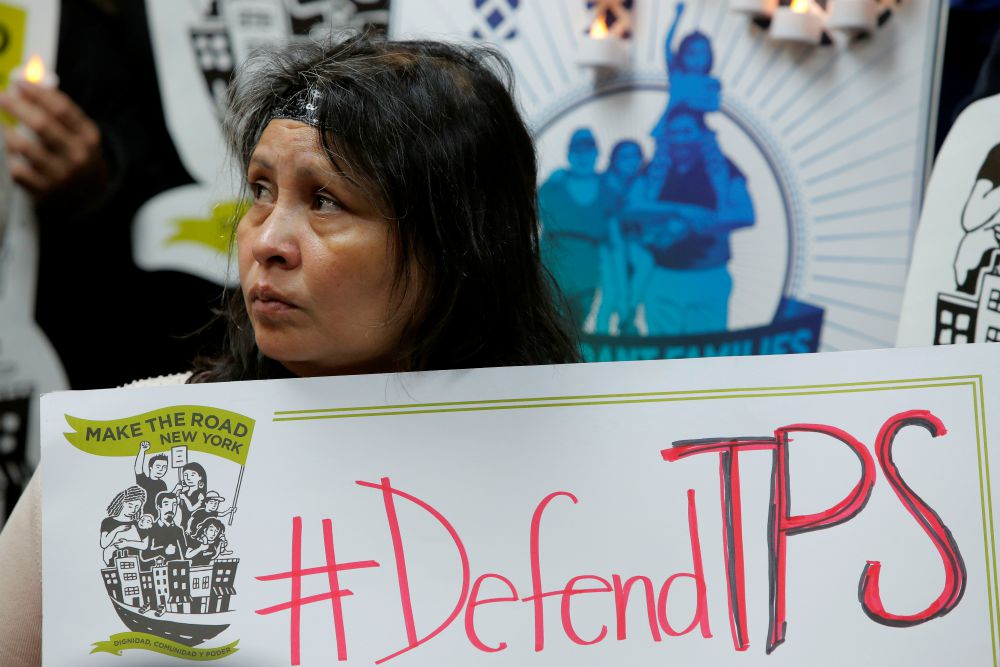
Salvadoran immigrant Mirna Portillo listens during a news conference Jan. 8 at the New York Immigration Coalition in Manhattan following U.S. President Donald Trump's announcement to end the Temporary Protected Status for Salvadoran immigrants. (CNS/Reuters/Andrew Kelly)
President Donald Trump reportedly has used vulgar language to express his beliefs that people from poor countries and people of color should not be welcomed into the United States. He specifically said that he prefers immigrants from countries like Norway.
Earlier he is said to have accused all Haitians of having AIDS. Further, he stated that Nigerians coming to this country will never want to go back to their "huts in Africa."
We are talking about the president of the United States making such comments. He is not a guy sitting in a bar talking with his drinking buddies. While that would still be offensive, in this case we have a president determining immigration policy based on these racist ideas.
The comments are outrageous, but what is most important are his actions. He has ended Deferred Action for Childhood Arrivals (DACA), the program to allow children who were brought into this country by their parents at an early age, to remain in this country (though a judge has blocked this for now). He has ended TPS (temporary protected status) for Salvadorans, Haitians and Nicaraguans. His administration has initiated aggressive deportation policies that separate families and go after law abiding residents who have lived here for years and contributed to this country.
Trump is one man, but he won an election. We have to wonder who his supporters are, and how many of them are there. We may not know the real answers to these questions until November, but what do we do in the meantime?
These remarks must be condemned by everyone. How about Republicans in Congress? We have heard little from them. Sen Lindsay Graham of South Carolina, who was in the room, has confirmed the remarks but been uneasy about blatantly condemning the president. Speaker of the House Paul Ryan described the incident as unfortunate, which does not constitute a stirring denunciation.
Two Republican senators who were also in the room have now flatly denied that the president used the offensive language. At first, they couldn't recall the remarks, and now they have moved to total denial. Frankly, their denials and confused memory are pathetic and are not believable.
Advertisement
The Congress needs to censure the president for these words. This president should not be able to continue to escape accountability for his words and actions. An effort at censure is being made in Congress, but will Republicans sign on to make clear these words and ideas do not represent them or their party? It seems unlikely.
World leaders have been more forthcoming. Many are beginning to see this president as a danger to national security. American troops operating in Africa may wind up being placed in harm's way because of this president's outbursts.
There has been some concern raised among Evangelical Christians, and there has been some slight erosion of support for Trump in some parts of the movement. Yet for the most part, we continue to see the religious right in lockstep with this president.
That brings us to Catholics. Again, there has been some criticism of Trump from Catholic leaders, but there continues to be considerable support for the Trump agenda and the Trump presidency.
I believe we need more from Catholics. Much more. Catholicism has a long history of support for social justice. Catholic priests and bishops marched in the Civil Rights movement of the 1960s and stood shoulder to shoulder with Dr. Martin Luther King, whom we celebrated this weekend.
We need an energetic and widespread movement that rivals the right-to-life movement. We need to recall how priests and bishops responded to the injustices of Jim Crow and segregation.
It wasn't easy then. Many in the pews were not in sync with the clergy, but efforts at consciousness raising bore fruit, and Catholics can claim an important role in the success of the civil rights movement.
Today many Catholics are supporters of President Trump for a variety of reasons. What do we say in the pulpit? Just as in the '60s, we need to speak truth to power and to our people. We need to bring injustice to the fore. We need to remind people of the worth, value, and dignity of every human being. We need to speak to the plight of the refugee and the oppressed. Yes, we need to speak to the obligation of government to protect the poor, disadvantaged, discriminated against and devalued among us.
Donald Trump represents the worst in America. He has brought into the public sphere: white nationalism, neo-Nazis in Charlottesville, not to mention a debasement in the whole area of sexual abuse.
Unless I'm wrong, and the church sees itself as sharing the values of this current president, then it is time to preach our social Gospel and work to end this anomaly that afflicts us in the body politic.






